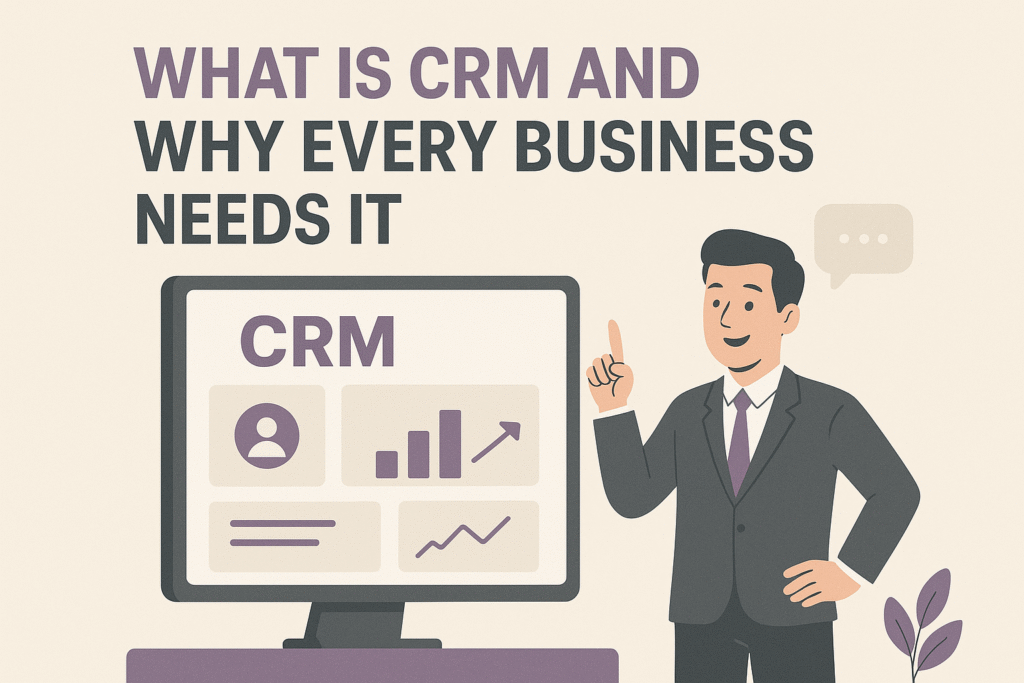In today’s fast-paced and highly competitive business environment, companies must do
more than offer good products or services—they must build meaningful, long-lasting
relationships with customers. As customer expectations evolve, the ability to deliver
consistent, personalized, and proactive service has become a major competitive advantage.
This is exactly where Customer Relationship Management (CRM) systems come in.
A CRM system is a centralized platform that helps businesses organize, automate, and
synchronize every aspect of customer interaction. Instead of relying on scattered
spreadsheets, manual entries, or disconnected communication channels, CRM brings
everything into one structured system. It acts as the backbone of a company’s sales,
marketing, and support strategies by ensuring that customer information is up-to-date,
accessible, and actionable.
What Exactly Is CRM?
CRM stands for Customer Relationship Management—a system designed to help
businesses manage interactions with current and potential customers. At its core, CRM
focuses on improving business relationships through data organization, activity tracking,
automation, and workflow efficiency.
A CRM system typically includes:
● Contact and customer information management
● Lead and opportunity tracking
● Sales pipeline visualization
● Communication logging (calls, emails, meetings, messages)
● Automated reminders and follow-up tasks
● Reporting and analytics for better decision-making
By storing all customer information in one place, CRM ensures that sales teams stay
aligned, organized, and equipped with the information they need to close deals and build
trust.
Why CRM Matters: Key Benefits for Every Business
- Centralized Customer Data
A CRM provides a single source of truth for all customer-related information. This ensures
that your entire team—sales, marketing, and support—has accurate and real-time access to
customer profiles, history, preferences, and communication logs. - Better Sales Pipeline Management
With CRM, businesses can visually track every lead as it moves through different sales
stages. This transparency helps teams understand which opportunities need immediate
attention and which are more likely to convert. - Automation That Saves Time
CRM systems automate repetitive tasks like:
● Follow-up reminders
● Email responses
● Status updates
● Data entry
● Lead assignment
This allows your team to focus more on building relationships and closing deals rather than
admin work. - Improved Customer Experience
With access to complete customer history, businesses can deliver more personalized
support and anticipate customer needs. This leads to:
● Higher customer satisfaction
● Stronger trust
● Enhanced loyalty
● Increased repeat purchases
Customers appreciate when a company remembers their preferences and communicates
consistently—and CRM makes that possible. - Data-Driven Decision Making
CRM systems come with dashboards and reports that give insights into:
● Lead conversion rates
● Sales performance
● Team productivity
● Customer behavior
● Forecasted revenue
This helps leaders make smarter decisions backed by real data instead of guesswork. - Reduced Missed Opportunities
Without CRM, businesses often forget to follow up on leads, misplace customer information,
or lose deals due to lack of organization. CRM eliminates these risks by:
● Tracking every lead
● Sending reminders
● Providing complete visibility of the sales funnel
No customer slips through the cracks.
Who Can Benefit from CRM?
Every type of business—across every industry—can benefit from CRM. Whether you’re
handling 20 customers or 20,000, the ability to track and manage interactions efficiently is
invaluable.
CRM is especially useful for:
● Small and medium businesses looking to grow revenue
● Startups needing structure and automation
● Sales teams managing multiple leads and follow-ups
● Service-based companies requiring customer history tracking
● E-commerce businesses wanting personalized marketing
● Enterprises integrating complex workflows
CRM adapts to the size and nature of your business and scales as you grow.
The Future of Business Is Customer-Centric
As digital transformation accelerates, customers expect faster responses, personalized
communication, and seamless experiences. Businesses that manage relationships efficiently
will outperform those that don’t. CRM is no longer a luxury—it’s an essential part of modern
business infrastructure.
With the right CRM, companies can improve productivity, strengthen customer connections,
and gain a clear competitive edge.

